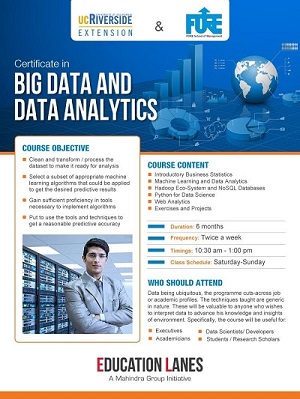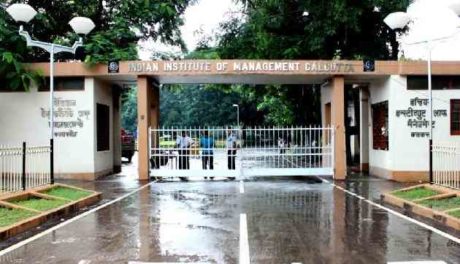“Certificate in Big Data and Data Analytics” to be delivered on our Virtual Learning Platform in a joint collaboration with FORE School of Management, New Delhi and University of California, Riverside, Extension USA.
Sharing here a brief on the Program Pedagogy:
Course in data analytics can only be practice-based rather than theory based. As it is a distance course but in real-time, the teaching pedagogy will be like this: First the algorithm will be conceptually explained without getting into mathematics and then a project will be undertaken to implement the technique. Datasets for implementation will be made available in advance and so also a copy of code we need to execute. The code will be numbered and copiously commented so that long after the lecture has finished, students can go back through the code/comments and refresh their knowledge. During the lecture, we will execute this code, line-by-line and explain the steps. At his end, the student will also execute the same code. Consequently, results will be available at our end as also on Students Laptop/desktop.
Program Description and Objectives
- Applications of Big Data transcend disciplines. Use of predictive analytics pervades diverse disciplines as oil and gas, marketing and sales, sports, molecular biology, drug-designing, waste management, finance and the list is very long. Smart cities, for example, are the melting pot where variety of big data technologies, mesh with one another to transform a city into a semi-intelligent being.
- In Marketing and Sales, Big Data is fast emerging as a potent tool to gain deeper insights into Customer behavior and thereby act as a strong driver in spurring innovation.
- In manufacturing, operations managers are employing advanced analytics on historical process data to identify patterns and relationships among discrete process steps and inputs, and then optimize the factors that prove to have the greatest effect on yield.
- Broadly the course has two parts: one the analytics part and second the technological part. The analytics part is about learning machine learning algorithms and implementing them, the technological part is about learning to work in hadoop ecosystem including NoSQL databases. At the end of this course, given a large dataset from any domain, a participant should:
- Be able to clean and transform/process the dataset to make it ready for analysis
- Be able to select a subset of appropriate machine learning algorithms that could be applied to get the desired predictive results
- Gain sufficient proficiency in tools necessary to implement algorithms
- Finally, put to use the tools and techniques to get a reasonable predictive accuracy
This course is project oriented: All tools and data, including hadoop-ecosystem, necessary for learning data-analytics are provided to the participants in advance.
Who should attend
Data being ubiquitous, the program cuts-across job or academic profiles. The techniques taught are generic in nature. These will be valuable to anyone who wishes to interpret data to advance his knowledge and insights of environment. Specifically, the course will be useful to:
- Executives -Ambitious Executives (from Private/Public sectors) looking forward to sharpening their skills in making sense of data in order to innovate and add more value to their organization and to society.
- Academicians -Lecturers and Professors for extending the horizon of their knowledge through deepening their research skills.
- Data Scientists/ Developers -Techniques taught to them will have applications in a broad array of discipline.
- Students/Research Scholars -IInd year students currently enrolled in Engineering / PGDM/ MBA or any graduate or post graduate program that have had an introductory course in statistics. These students can look forward to better placement opportunities with added skill set.
Pedagogy
We strongly believe that a course in data analytics can only be practice-based rather than theory based. As it is a distance course but in real-time, the teaching pedagogy will be like this: First the algorithm will be conceptually explained without getting into mathematics and then a project will be undertaken to implement the technique. Datasets for implementation will be made available in advance and so also a copy of code we need to execute. The code will be numbered and copiously commented so that long after the lecture has finished, students can go back through the code/comments and refresh their knowledge. During the lecture, we will execute this code, line-by-line and explain the steps. At his end, the student will also execute the same code. Consequently, results will be available at our end as also on Students Laptop/desktop.
Program Duration: 6 Months
Course Schedule
Two Sessions of 2.5 hours per week on Sat-Sun
Class Timing
Saturday – 10:30 AM to 01:00 PM
Sunday – 10:30 AM to 01:00 PM
Assessments
Based on Performance in Exercises & Projects
Program Delivery
The sessions will be delivered on Growth Factories Growth Factories interactive learning platform.
Course Material
Course material will be shared either through cloud or in hard copy with all the participants at the appropriate time.
Total Fees
All Fees are payable by Student directly to Tech Mahindra Growth Factories Limited
Course Fee :
Rs. 55,000/- + Applicable Tax
Rs. 5000/- Book and Material(Mandatory Fees)
Collection of Fee:
| Installment Schedule | Registration Fees | Admission Fees | 1st Installment |
| Installment Amount | 10,000/- + Applicable Tax | 25,000/- + Applicable Tax | 20,000/-+ Applicable Tax |
| Installment Date | At the time of Enrolment | 15th February 2017 | 15th May 2017 |
| Other Fees (Directly payable to FORE) |
Book and Material (Mandatory fees) | Rs 5000/- per participant | Payable to FORE School of Management, New Delhi |
| Course Launch Schedule | Finalization of selection process & Offer letter to be sent to the participants | 08th February 2017 | |
| Last Date of Admission Fees | 15th February 2017 | ||
| Declaration of the list of enrolled candidates | 16th February 2017 | ||
| Technical and Academic Orientation | 25th February 2017 | ||
| Online Class start date | 26th February 2017 | ||
Course Curriculum
Course Reviews
No Reviews found for this course.




